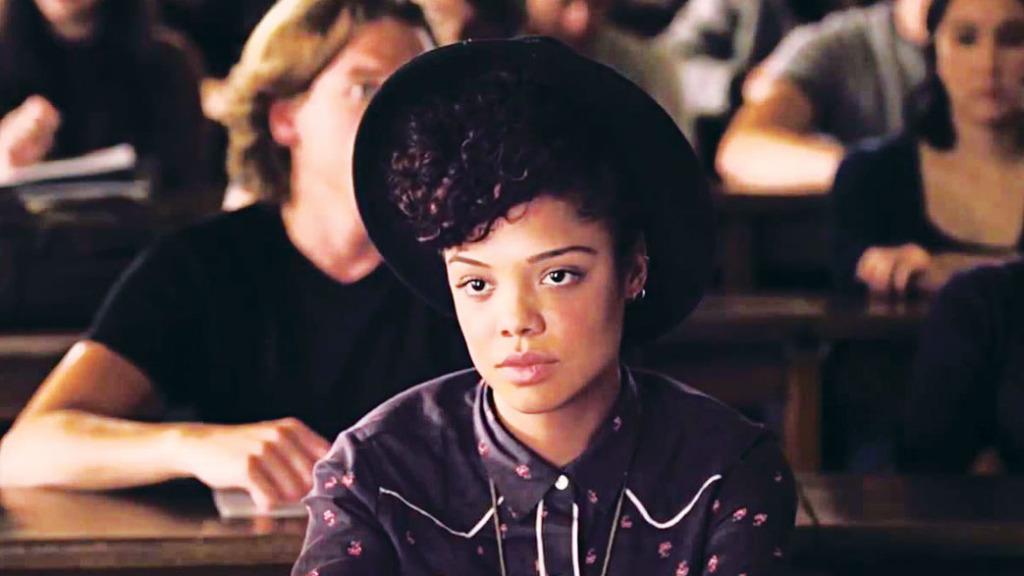Racism. Just saying the word is enough to either hush a room or incite hasty declarations. In today’s society, tensions still flare, notably on college campuses. With “Dear White People,” first-time director Justin Simien takes a satirical look at race relations as they function within the generation of the Obama Age. Through a myriad of characters, both specific and broad in their construction, the film attempts to address common dilemmas with honest humor, to varying degrees of success.
The microcosmic setting of the film is Winchester University, a prestigious institution with Ivy League credentials. The dean is black, the president is white and the student body is diverse. However, divisions are forming thanks, in part, to an outspoken student named Sam White (Tessa Thompson). Her radio program is the namesake of the film, and in it, she offers biting quips on modern discrimination and white ignorance. The sentiments are truthful to a point, but their delivery is extreme and feathers are inevitably ruffled. Some, like cocksure house president Troy Fairbanks (Brandon P. Bell), don’t see the point in dredging up racial issues, while others, like shy underclassman Lionel Higgins (Tyler James Williams), sympathize with White’s feelings, but balk at the radical approach. An ideological war of words is begun, and as the film delves into characters’ personal lives, hypocrisies are soon discovered. Ultimately, all roads lead to an ill-conceived Halloween party, where conflicts reach their boiling point.
“Dear White People” thrives on the accuracy of its satire. Rather than dwelling on tired topics, the film focuses on contemporary notions of racial identity as well as the persistence of microaggressions as the new and perhaps unintentional form of bigotry. Whether it is Caucasians curiously rifling through a black student’s afro or a condescending question meant to be friendly, the film’s truths are humorously represented, and the somewhat uninhibited approach is refreshing. At the same time, it is important to note that the roots of the issues are not neglected. Clever use of negative space and the visual motif of bright white busts adorning Winchester’s halls keeps a history of oppression in perspective without compromising the film’s bracingly present sensibility.
Supporting the comedy is a collection of intelligent characterizations. When they aren’t exaggerated for the benefit of the film’s humor, the characters are shown to be quite complex. The greatest manifestation of such intricacy is in Coco Conners (Teyonah Parris), a student whose external identity is in a constant state of reinvention as a result of her drive toward acceptance and success. These individuals are clearly more than meets the eye, as vulnerabilities and contradictions gradually come to light. All the players are critiqued, no one is left off the hook, and that’s the beauty of “Dear White People.” It rarely laughs at its characters, tenderly considering their shortcomings and not allowing itself to fully embrace one side.
Unfortunately, “Dear White People” is beset with a number of problems, many of which drown out the film’s aforementioned strengths. Its struggle with subtlety is chief among these. From the self-satisfied dialogue, dropping names and pop culture references at every turn, to the rampant expositing of core themes, the film is numbing in its insistence on flashy writing as a means to convey a blunt message. Further complicating things is a general clumsiness in fitting ideas on race into a workable narrative. While the characters are cleverly drawn, the story they inhabit is not, as plot contrivances arise and conventional developments upset an otherwise offbeat premise. Inconsistent and tonally jumpy, the film is just as paradoxical as its subjects and not in a way that is mutually beneficial.
All its troubled aspects aside, “Dear White People” must be commended for forcefully taking on subject matter that is too often tiptoed around. The film comes onto the scene with a genuine enthusiasm and sense of responsibility that has been sorely missed from this type of issue-based cinema, the brash energy it so persuasively wields normally ditched in favor of stodgy sermonizing. While the film suffers from its own brand of pushy preaching, it still manages to be reasonably smart, accessible and entertaining. The second coming of “Do the Right Thing” this isn’t, but it’s a debut signaling the emergence of an exciting new socially conscious voice in cinema — and that is something worth celebrating.




















